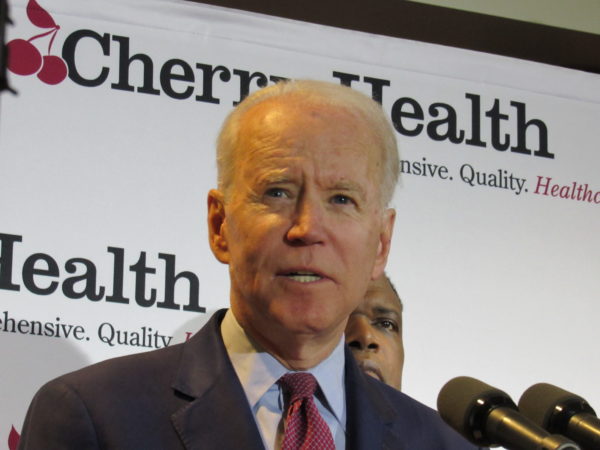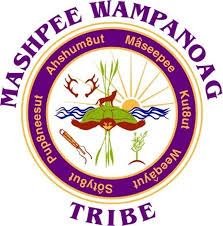
- Details
- By Native News Online Staff
WASHINGTON— Both Democratic Party presidential candidates, former Vice President Joe Biden and U.S. Sen. Bernie Sanders (I-VT), released statements in support of the Mashpee Wampanoag Tribe’s fight to retain its trust land.
The statements were issued in response to a call made last Friday to Mashpee Wampanoag Tribe Chairman Cedric Cromwell from the Bureau of Indian Affairs. During the conversation, the bureau informed Cromwell that the U.S. Department of the Interior Secretary David Bernhardt was ordering him to disestablish the tribe’s reservation. Former Vice President Joe Biden released this statement Tuesday:
“This past weekend, in the midst of a pandemic, the Trump Administration chose to expend effort and resources to attempt to remove land that the Obama-Biden Administration put into trust for the Mashpee Wampanoag Tribe and disestablish the Tribe’s reservation — before the Tribe had exhausted its ability to appeal in the courts. This is unacceptable and betrays an incredible disrespect for Mashpee rights.

U.S. policy has for too long broken trust with tribal nations. It’s time to choose a different path. One of the most important roles the federal government plays in rebuilding the nation-to-nation relationship is taking land into trust on behalf of tribes. It is critical for tribal sovereignty and self-determination. It preserves tribal histories and culture for future generations. It allows for economic development and helps support the well-being of tribal citizens. It helps to right the wrongs of past policy, including the dispossession by the U.S. government of 90 million acres of tribal land, nearly two-thirds of all tribal land. The Obama-Biden Administration recognized this vital responsibility and took more than half a million acres of land into trust for tribes — including for Mashpee Wampanoag Tribe.
The Supreme Court’s Carcieri decision made fulfilling that responsibility harder by restricting the federal government’s ability to put land into trust. When I served as Vice President, our Administration asked Congress to enact a clean fix of the Carcieri decision. We also included language in our budgets to make clear that addressing this decision was a priority. Our Department of Interior developed a post-Carcieri framework to determine if tribes were under federal jurisdiction before 1934, and our Department of Justice used this framework to defend the process of taking land into trust. Indeed, courts that reviewed decisions under that framework embraced Interior’s analysis. But the Trump Administration has callously reversed the Obama-Biden policies, and abandoned our nation’s treaty obligations to tribal nations.
Upholding tribal self-governance and sovereignty, respecting tribal reserved rights in treaties, and supporting the federal trust responsibility to tribal nations should be the cornerstones of our federal tribal policy. That’s why, as president, I will support a clean Carcieri fix.
I stand with Mashpee — and with all of Indian Country.”
The following is Sen. Sanders statement:
“I stand with the Mashpee Wampanoag tribe in their fight to restore lands that belong to them, and I oppose the disgraceful decision by the Trump Administration to disestablish their lands held in trust by the Department of Interior.
For far too long, the federal government has adopted policies that take land away from tribes, ignore treaty rights and interfere with tribal management of their own resources. We must reset the partnership between the federal government and Tribal Nations by putting land – and control of that land – back in the hands of tribes.
 Sen. Bernie Sanders speaking at Calder Plaza in Grand Rapids, Mich. Native News Online photograph by Levi Rickert
Sen. Bernie Sanders speaking at Calder Plaza in Grand Rapids, Mich. Native News Online photograph by Levi Rickert
We need a clean Carcieri fix to reaffirm the authority of the Secretary of the Interior to take land into trust for all federally recognized Indian tribes. A Sanders administration will prioritize that.”
More Stories Like This
50 Years of Self-Determination: How a Landmark Act Empowered Tribal Sovereignty and Transformed Federal-Tribal RelationsThe Shinnecock Nation Fights State of New York Over Signs and Sovereignty
Navajo Nation Council Members Attend 2025 Diné Action Plan Winter Gathering
Ute Tribe Files Federal Lawsuit Challenging Colorado Parks legislation
NCAI Resolution Condemns “Alligator Alcatraz”
Help us defend tribal sovereignty.
At Native News Online, our mission is rooted in telling the stories that strengthen sovereignty and uplift Indigenous voices — not just at year’s end, but every single day.
Because of your generosity last year, we were able to keep our reporters on the ground in tribal communities, at national gatherings and in the halls of Congress — covering the issues that matter most to Indian Country: sovereignty, culture, education, health and economic opportunity.
That support sustained us through a tough year in 2025. Now, as we look to the year ahead, we need your help right now to ensure warrior journalism remains strong — reporting that defends tribal sovereignty, amplifies Native truth, and holds power accountable.
 The stakes couldn't be higher. Your support keeps Native voices heard, Native stories told and Native sovereignty defended.
The stakes couldn't be higher. Your support keeps Native voices heard, Native stories told and Native sovereignty defended.
Stand with Warrior Journalism today.
Levi Rickert (Potawatomi), Editor & Publisher

